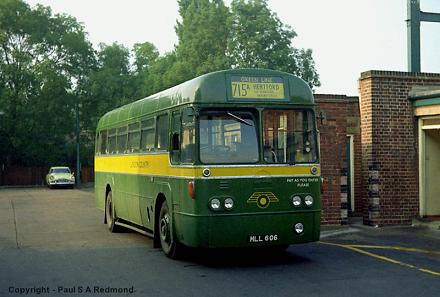 Kingston RF
2009 Kingston RF
2009
Routes 715
and 715A
Modernised but demoted to
bus status, RF219 waits for something to happen -
presumably at Guildford Leas Road garage?
Photo © Paul Redmond
Green Line route 715 was one of the first two routes
introduced on the recommencement of Green Line express coach
services after the war, made famous by its association
with the RMC Routemaster coach.
Original RF routes
715: GUILDFORD via Ripley, Esher, Tolworth (Kingston from
1977), Shepherds Bush, Oxford Circus, Enfield and Ware to
HERTFORD
715A (1956 - 1969): HERTFORD via Hertford Heath,
Tottenham to LONDON Marble Arch
715A (1971 - 1977): GUILDFORD via Ripley,
Esher, Kingston, Shepherds Bush, Oxford Circus, Enfield and Ware to
HERTFORD
Timetable
The 215/ A and 715 A will together
provide a service between Kingston and Cobham,
with 715 A journeys running via Hampton Court
and extended to Ripley. Timetable.
A feeder service from and to London
will run on the 715 (but not over Hammersmith Bridge, which is now
weight-restricted).
Kingston Cromwell Road Bus Station stop A3
Esher Sandown Park
Note that northbound buses from Ripley will serve Cobham
Police Station in Portsmouth Road, not Church
Cobham.
Another modernised RF
reduced to bus status. Hertford's RF102 shows the restricted
blind display needed by London Country RFs due to the length of
blinds required at many garages. It is leaving Guildford in
August 1973 for the long return run on the 715.
Route history
The origins of the Guildford to London Oxford
Circus coach route go back before the formation of
Green Line in 1930, to Mr Charles Dobbs' Skylark Motor Services,
which started operating in December 1928 with this as its first
route. The new Kingston by-pass was used, and it and its
Green Line successors did not serve Kingston until
1971. Nine months later, Skylark commenced operation between
Oxford Circus and Hertford, then in December 1929 joined the two
routes together. In doing so, they pioneered the cross-London
service that became the hallmrk of the Green Line.
Guildford to London Oxford Circus was also the
first route introduced by the newly registered Green Line Coaches
Ltd in July 1930, in direct competiton with Skylark. Skylark
was taken over by Green Line in 1932, prior to the formation of the
LPTB which saw the absorbtion and rationalisation of almost all
London area coach services.
Green Line services were given letters in 1931, with the
Guildford service (briefly not cross-London) as service G, later M
(Guildford to Hertford) then M1. The M1 and sister
routes hosted the new 6Q6-class coaches on their introduction in
1936. Green Line services were suspended just before the
outbreak of war in September 1939; on the temporary reintroduction
in 1940, the M1 became route 18.
From 6 Feb 46, Green Line services were gradually reintroduced
after the war. One of the first two routes was the
715, over the former M1 route between Hertford and
Guildford. RFs arrived for the 715 at both Guildford and
Hertford garages in December 1951 and January 1952. New route
715A was introduced on 11 Jul 56, running between
Hertford and Marble Arch via Hertford Heath rather than Ware and
Tottenham rather than Enfield.
Following the testing of the prototype Routemaster Coach,
including on the 715, LT ordered 68 RMCs and the first twenty
entered service on the 715 and 715A in August 1962,
replacing RFs and featuring extensively in LT's publicity.
The longer Routemaster coaches, the RCL class, arrived in 1965 and
a few went to Hertford for the 715A. This route
was withdrawn in February 1969, having seen its traffic reduce in
competiton with the railway and the new Victoria Line.
After the transfer of the Country Bus & Coach department
to London Country in 1970, one-man operation became
imperative and in 1972 the RMCs and RCLs gave way to the new
RP class of Reliance coaches. Before this, alternate
Saturday journeys on the 715 were diverted via Kingston and
numbered 715A from May 1971; the whole route was
diverted this way in April 1977 and renumbered 715. As is
well known, London Country suffered severe vehicle problems in the
1970s, and elderly RFs were not uncommon replacements for modern
coaches.
|